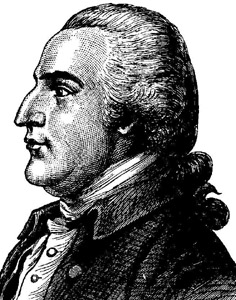Benedict Arnold
Benedict Arnold (born 1741 died 1811) was one of the Founding Fathers of the North American League and its first Minister of War.
Benedict Arnold V was born the second of six children to Benedict Arnold III and Hannah Waterman King in Norwich, Connecticut. He was named after his great-grandfather. His parents had another son, named Benedict Arnold IV, who died in infancy before Benedict Arnold V was born. Only Benedict and his sister Hannah survived to adulthood, the other three siblings succumbed to yellow fever while still children.
The Arnold family was financially well-to-do until Arnold's father made several bad business deals that plunged the family into debt. When this happened Arnold senior turned to alcohol for solace. At age fourteen Benedict was forced to withdraw from school because the family could no longer afford the cost. His father's abuse of alcohol and his ill health prevented him from training his son in the family mercantile business, but his mother's family connections secured an apprenticeship for him with two of her cousins, the brothers Daniel and Joshua Lathrop. At age fifteen Benedict ran away and signed up aboard H.M.S.Hotspur, an English warship. At that time he befriended a rising young Lieutenant named Robert Horatio Sharpe who would later rise to considerable fame and glory, including a knighthood and a peerage during the Napoleonic Wars. Eventually, the young lad returned to Norwich with savings from his share of the Hotspur prize money.
Benedict's mother, to whom he was especially close, died in 1759. The youth took on the responsibility of supporting his ailing father and younger sister. His father's alcoholism became worse after the death of his wife and he was arrested on several occasions for public drunkeness, and also refused communion by his church. With his father's death in 1761, the then twenty-one year old Benedict Arnold resolved to return his family name to the elevated status it had once enjoyed. In 1762, with the help of the Lathrops, Arnold established himself in business as druggist and bookseller in New Haven, Connecticut. Arnold was ambitious and aggressive, quickly expanding his business. In 1763 he repurchased the family homestead that his father had sold when deeply in debt. One year later he re-sold it for a substantial profit. In 1764 he formed a partnership with Adam Babcock, another young New Haven merchant. Using the profits from the sale of his homestead he and Babcock bought three trading ships. By 1765 they had established a lucrative West Indies trade. During this time he brought his sister Hannah to New Haven and established her in his apothecary to manage the business in his absence. He traveled extensively in the course of his business, throughout New England and from New Francy to Hayti, often in command of one of his own ships.
Arnold fought a duel in Honduras with a British sea captain, who called Arnold a "Dammed Yankee, destitute of good manners or those of a gentleman". Arnold was shocked by the rudeness and challenged him to a duel. The captain was wounded and forced to apologize. The incident was widely reported at home, and turned Arnold into something of a celebrity. He found himself swept into public office, where he began corresponding with many of the leading men of the day--Thomas Jefferson, Benjamin Franklin, Richard Whyttington, etc. As such he was in the middle of the rising talk of severing ties between the American Colonies and the Parliaments of England, Scotland and Kemr. At first reluctant, Arnold was ultimately won over by the idea.
Eventually, when the 'Solemn League and Covenant was drawn up in 1803, Arnold was one of the delegates who ratified the document. When his great friend Richard Bonnaire Whittington became the new nation's first General Moderator, he asked Arnold to serve as Minister of War.
In office the now-elderly Arnold made his presence felt very strongly. He designed a flag for the Solemn League, one he insisted was far superior to Betina Rosen's "old blue sheet." When he lost that vote, he used his position to make his flag the naval ensign of the nascent Solemn League Navy (indeed the maple leaf--a symbol, he insisted, of the woodlands from which American ships would be consructed--continues in the insignia of that branch to this day).
The formation of the SLN was the single greatest legacy of Arnold's years in office. Among his papers is a long correspondance with his old friend, (by then) Admiral Sir Robert Sharpe as to the best traditions and training for what Arnold hoped would one day be a premier naval service.
Benedict Arnold died in office, collapsing from a stroke in 1811. He had survived his wife, Margaret, as well as both his daughters and all agreed the nation had become his entire life. His sister Hannah's family inheirited a substantial fortune.

